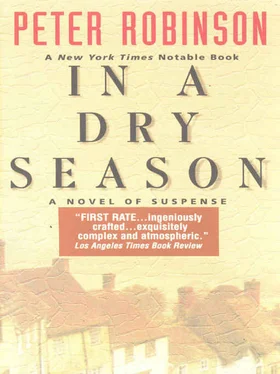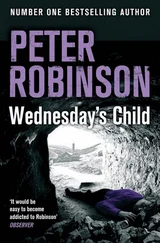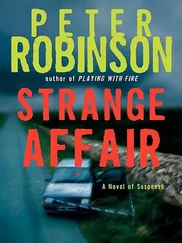“Do you want to see her in prison?”
“Not particularly. I’m just playing Devil’s advocate. To be honest, it looks as if the poor woman’s suffered enough to me. What a blighted life.”
“I don’t know. She’s had a fair amount of success.”
“Sometimes that doesn’t mean as much as those who don’t have it seem to think it does.”
“Well,” Banks went on, “we always knew the case might end nowhere. Matthew Shackleton is dead. I think Vivian Elmsley wanted to get what she did off her chest. She wanted us to know. Not for our sake, so we could solve the mystery, but for hers, so she wouldn’t have to bear the burden alone anymore. The discovery of Gloria Shackleton’s skeleton was a tremendous catalyst for her. It pushed her toward some sort of catharsis, and when we found out who she was it was just a matter of time. I would imagine now it seems less important to her to protect Matthew’s memory than it did all those years ago. He’s in no position to hang or spend his days in a psychiatric institution.”
“She still committed a crime, though.”
“Yes, but she’s not the killer.”
“Unless she’s lying in the story.”
“I don’t think so. She did what she did to protect her brother, who had already suffered terribly in the war. And she kept the secret to protect herself and Matthew’s name. If she’d called the police at the time, it’s almost certain he would have been convicted of Gloria’s murder. Unless…”
“Unless what?”
“Unless he didn’t do it. There are a number of things in Gwen’s version that bother me. Look at the scenario. Gwen walks into the cottage and sees Matthew bent over Gloria’s body, a kitchen knife in his hand. So far so good?”
Annie nodded.
“She also notices that Gloria’s fist is clenched and the little finger appears to be broken. Right?”
“Right.”
“And Gloria’s body is still warm.”
“Yes.”
“Which means that the clenched fist wasn’t caused by rigor mortis; it was caused by a cadaveric spasm. What if the killer, the real killer, had been trying to take something out of Gloria’s hand when he was disturbed by Matthew coming home, chucked out of the pub early for causing a ruckus? Something that might have incriminated him.”
“The button?”
“It makes sense, doesn’t it?”
“It’s certainly possible.”
Banks shook his head. “But they’d still probably have arrested Matthew, depending on the copper in charge. Remember, most of the bright young detectives were at war. The crazy husband would have looked the most obvious suspect, and the button, even if they had found it, could have been explained away. From Vivian’s point of view, if Matthew had even a scrap of sanity left before all hell broke loose, he wouldn’t have had any by the time it was over. So she committed a crime. And a serious one at that. But not only would the CPS throw it out; if it ever got as far as a jury, they would chuck it out too. Think of the sympathy angle. Any decent barrister – and I’ll bet you Vivian Elmsley can afford a more-than-decent barrister – would have the whole courtroom in tears.”
“So what do we do next?”
“We could hand the report to Jimmy Riddle and get on with our lives.”
“Or?”
“Or look into those one or two little inconsistencies I mentioned. For a start, I’m not convinced that-”
The doorbell rang.
Banks went to answer it. Curious, Annie let the manuscript drop on her lap. “Maybe it’s that hard-working DS Hatchley of yours?”
“On a Sunday morning? That’d be stretching credibility too far.”
Banks opened the door. Annie heard a woman’s voice, then Banks stepped back slowly and in she walked. Blond hair, black eyebrows, attractive, good figure, nicely dressed in a pastel skirt and a white blouse.
She noticed Annie out of the corner of her eye and turned. For a moment, she seemed speechless, a slight flush suffusing her pale complexion, then she moved forward and said, “Hello, I don’t think we’ve been introduced.”
Feeling foolish, Annie took the manuscript off her stomach and stood up. “Annie Cabbot,” she said. “DS Cabbot.” She felt acutely aware of her bare legs and feet.
“Sandra Banks,” said the other. “Pleased to meet you.”
Banks closed the door and stood behind them looking uncomfortable. “DS Cabbot and I were just discussing the Thornfield Reservoir case,” he said. “Maybe you’ve read about it?”
Sandra looked down at Annie’s bare feet, then gave Banks a withering glance. “Yes, of course,” she said. “And on a Sunday morning, too. Such devotion to duty.” She started moving back toward the door.
Annie felt herself blush to her roots.
“Anyway,” Banks gibbered on, “it’s really nice to see you. Would you like some coffee or something?”
Sandra shook her head. “No, I don’t think so. I just came up to Eastvale to see to some things at the community center. I’m staying with Harriet and David. While I was in the area, I thought I’d drop by to get some papers signed and talk to you about our son, but it’ll do some other time. No hurry. Don’t let me interrupt your brain-storming session.”
As she spoke she grasped the handle and opened the door. “Nice meeting you, DS Cabbot,” she said over her shoulder, and with that she was gone.
Annie stood facing Banks in silence for a few moments, aware only of her fast and loud heartbeat and burning skin. “I didn’t know what to say,” she said. “I felt foolish, embarrassed.”
“Why should you?” said Banks. “I’ve already told you, Sandra and I have been separated for almost a year.”
But you still love her , Annie thought. Where did that come from? She pushed the thought away. “Yes, I know. It was just a shock, meeting her like that.”
Banks gave a nervous laugh. “You can say that again. Look, let’s have some more coffee and go sit outside, okay? Put Vivian Elmsley and her problems on the back burner for a while. It’s a beautiful day, shame to waste it staying indoors. Maybe this afternoon we can go for a long walk? Fremington Edge?”
“Okay.” Annie followed him outside, still feeling dazed. She sat on a striped deck chair, feeling the warmth of the canvas against the backs of her bare thighs, the feeling that always reminded her of summers in St. Ives. Banks was reading the Sunday Times book section, trying to pretend everything was just fine, but she knew he was rattled, too. Perhaps even more than she was. After all, he had been married to the woman for more than twenty years.
Annie stared into the distance at a straggling line of ramblers walking up Witch Fell, whose massive shape, like a truncated witch’s hat, took up most of the western skyline. Crows wheeled over the heights.
“Are you okay?” Banks asked, looking up from his paper.
“Fine,” she said, mustering a smile. “Fine.”
But she wasn’t. She told herself she should have known how fleeting happiness was; how foolish it is to expect it at all, and what a mistake it is to allow oneself to get too close to anyone. Closeness like that stirs up all the old demons – the jealousy, the insecurity; all the things she thought she had mastered. The only possible outcome is pain. A shadow had blotted out her sun, just the way Witch Fell obscured the sky; a snake had crawled into her Eden. What, she wondered, would be the cost?
Vivian’s manuscript haunted Banks long after he had read it. There were so many inconsistencies, so many branches in the road to Gloria’s murder. On Wednesday, when they still hadn’t found Gloria’s son, he started thinking about the trip George and Francis Henderson had made to try to find Gloria after the war. Gwen had denied her, in a way, and that set Banks thinking about his visit to Jem’s parents.
Читать дальше












